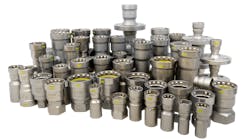Plumbing and HVAC companies throughout the U.S are experiencing a greater decrease in business than ever before due to stock prices nose-diving on Sept. 29 and the economic downturn of the past two months.
“Last year we were busy, now it's at a point where there are not many jobs,” commented Keith Bienvenu, owner of Bienvenu Brothers Enterprises in Metairie, La. “I don't see much change happening until after the election — a key/critical issue right now in this country. It is the uncertainty of the direction of the U.S. that has everyone skeptical right now.”
According to Bill Chronister, president of The Earl's Plumbing in Rancho Santa Margarita, Calif., business seems to be spotty and will probably get worse.
Businesses have been forced to downsize and reinvent themselves to counteract the affects of the economy.
“The economic downturn has forced us to specialize - we were involved in new construction, but now we are in remodeling and service work, and we have become knowledgeable regarding higher quality items that can save money in the long run for the consumer,” said Mike Genson, owner of Mike Genson's Plumbing in Highland, Mich. “We had to cut staff also. We had 50 employees, and now we are down to 12 employees.”
Some companies have implemented cost effective practices to cut back on expenses or increase advertising budgets.
“We have GPS in our vehicles set to alert us of speeding to save on gas,” commented Doug Santoro, president of General Plumbing Inc. in West Palm Beach, Fla. “Saving on gas has allowed us to increase our marketing budget and direct marketing - this is how we brand our business, which is very important during this time.”
Other plumbing and HVAC companies have decreased prices.
“I have dropped prices on service calls and jobs to compensate for the economy,” stated Jared Hoffert, master plumber at After-Hours Plumbing in Dearborn, Mich.
Contractor still receive emergency calls, which help them sustain during unstable times.
“Service and repair calls are down 15% to 17% this year,” said Chronister. Even though the economy is bad, many people will continue to call when we are needed - the demand for service during an emergency is still strong. When a toilet breaks it has to be repaired. But the optional remodeling side of the business has decreased since it is not absolutely necessary to do.”
Big new construction and service contractors have also been hurt.
There's clearly been a drop in short-term commercial office building work, said Tony Guzzi, president and chief operating officer of EMCOR Group. Because EMCOR owns contracting operations around the country, Guzzi has a broad perspective.
“Nobody is talking about bringing a new building out of the ground today,” Guzzi said. “We've got to get the sanity back in the credit markets.”
Guzzi noted that contractors have not seen large-scale cancellations in the last four weeks, but that a slowdown is absolutely expected.
“Only the best capitalized contractors will get significant work,” Guzzi predicted. “Surely bonding, too, will tighten or will require more equity participation, particularly from smaller contractors if they expect to do the work. If you haven't invested in prefabrication and [building information modeling] and those kinds of things, it will be hard to get the productivity that you need to get projects done.”
On the plus side, the dramatic slowdown in the economy is causing commodity prices to fall, and lower steel and copper prices might make some projects more attractive.
Hospitality and commercial developers will have to put more equity into a project, Guzzi said, and they will not be able to leverage a project 15:1 or 20:1.
“If housing slows in the Sunbelt, then you'll need fewer schools, strip malls and mega churches, “ Guzzi noted. “That will be a big part of the downturn. I think we're ‘over-stored’ and we have been for a while. I think in some places they were building schools based on housing that won't get built.”
The better-capitalized state university systems that are based on research will continue building, he said, as will alternative energy and bio-tech.
Because of giant banks buying out other giant banks, all of their office space will need to be reconfigured, data centers merged or bigger data centers built.
Big city downtown condo projects will finish out, he said, but no new ones will start.

